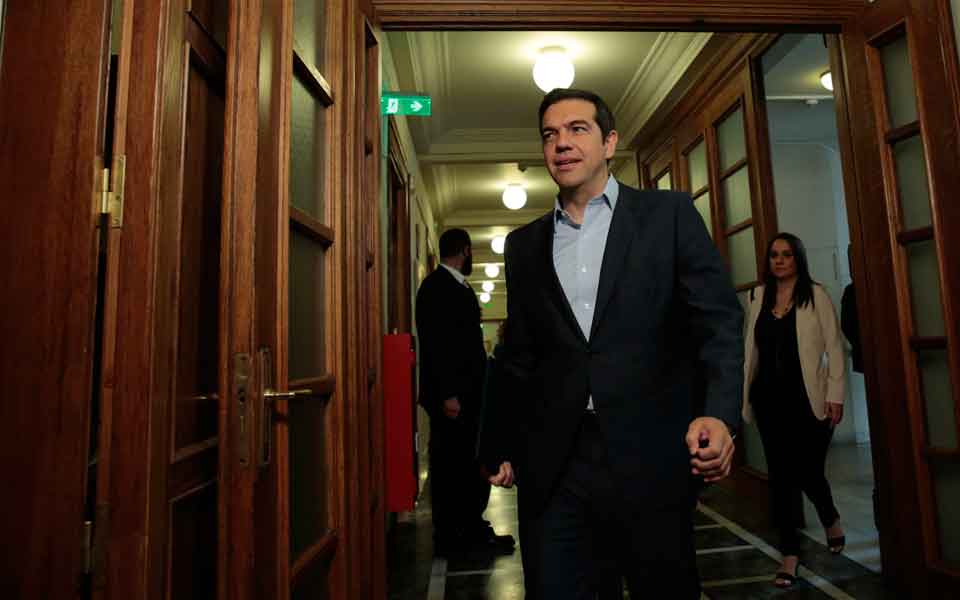No letup for Tsipras over the summer

The panic is over, but there is a great deal of work ahead. This was the prevailing message over the last few days both within Greece and from those abroad who have a direct interest in the country’s future.
During last Wednesday’s cabinet meeting, Prime Minister Alexis Tsipras warned his ministers that they cannot let up in the wake of the agreement reached at the Eurogroup on June 15. Even though the premier claimed his government had been “vindicated” by the deal, he knows that events in the coming months will determine whether it simply averted disaster or contributed to a definitive breakthrough.
The buzzword at the cabinet meeting was investment. Tsipras is aware that his political future and the country’s prospects depend on money flowing into the Greek economy and this gradually translating into growth, job creation and increased household income.
One of the reasons that there was a pleasant surprise in the first quarter of the year, when gross domestic product increased by 0.4 percent on a quarterly basis according to provisional data, was a substantial increase in investment. Gross capital formation rose by 48.3 percent in Q1.
It is no surprise, therefore, that Tsipras urged his ministers to pull out all the stops and ensure that investment projects are not held up. Of course, identifying the challenge and responding to it effectively are two very different things.
Apart from investment in the real economy, the SYRIZA leader also knows that his government must begin the process of wooing the financial community because only market access can guarantee an exit from the program next year. It is no coincidence that as Tsipras spoke to his cabinet, Economy Minister Dimitris Papadimitriou had already packed his bags for the US and Finance Minister Euclid Tsakalotos was preparing for a less advertised trip to London.
The fact that the Eurogroup agreement did not satisfy the International Monetary Fund enough for it to join the Greek program with funding and was not deemed sufficient for the European Central Bank to accept Greek bonds in its quantitative easing scheme was a blow to the plans Athens had for a swift return to the markets. However, as Greek bond yields dropped last week, the coalition started to believe that despite missing its targets in the negotiations with the institutions, market access in the near future may be a possibility.
Papadimitriou was one of several government officials who argued last week that the continued exclusion from the ECB’s asset-purchase program should not be seen as an obstacle to conducting a trial bond issue. “I think access to QE is more symbolic in nature than an actual credit extension,” he told Bloomberg TV. “I believe, based on the expression of interest that I have seen, that Greece will be able to access the markets even without QE.”
Again, talking about a return to the bond markets and executing one are two different things. However, it is clear the Greek government has to think seriously about tapping investors in the months ahead if it wants to rebuild its relationship with the markets and have the option of being able to turn to someone other than the official creditors for funding once the current bailout expires in August 2018.
The one advantage that Athens has in this pursuit is that it is also in the lenders’ interests to pave the way for a market comeback. If Greece is able to borrow at sustainable rates in the next 14 months, it means the option of a fourth program, which is so alarming for everyone involved, does not have to be seriously considered.
Speaking to state broadcaster ERT at the beginning of last week, European Stability Mechanism managing director Klaus Regling expressed confidence that Greece could issue a bond for the first time since 2014 soon.
“I don’t know about the exact months, but I think late this year or early next year, it may well be possible to go back to the market,” said the German official. Regling pointed out that Portugal, Ireland, and Cyprus also tapped the markets several months before they completed their bailouts in order to get a sense of how investors would react once the creditors stepped out of the picture.
He added, however, that this would be contingent upon the government maintaining its commitment to the reforms it has agreed with the institutions. “Because markets look carefully at what is happening; is there ownership of the program, will the government continue to implement what was agreed with the Eurogroup and the ESM?” he explained.
This brings us to the other challenge that the coalition faces in the coming months. Usually, the summer is a period of relative political and legislative inactivity, but this year the government will hardly have a chance to catch its breath.
As Kathimerini revealed last week, Athens will have to complete 83 prior actions over the summer as part of the agreement it reached with the institutions on June 15. The government had to tick 140 prior actions off its list before the Eurogroup in Luxembourg and will have to keep up this pace to be on track in September.
Regling also pointed out last week that Athens will have to meet certain conditions before it can receive the second of the two sub-tranches that will make up the 8.5 billion euros in new funding agreed with the lenders.
“The first disbursement is expected to take place in the beginning of July, after the completion of national procedures, and will amount to 7.7 billion,” he wrote in an ESM investor relations newsletter.
“There will be another disbursement to clear arrears of 0.8 billion, expected to take place after the summer, and only if Greece has contributed with its own resources to the effort to clear arrears,” he added.
This means that in the months to come, the coalition will have to use 800 million euros from the first sub-tranche to reduce its arrears and then set aside public funds for further payments to suppliers before the ESM disburses the next 800 million.
This leaves no doubt that even though an agreement was reached between Greece and its creditors on June 15, much to everyone’s relief, the pace that Athens must maintain will be relentless for some time to come.





